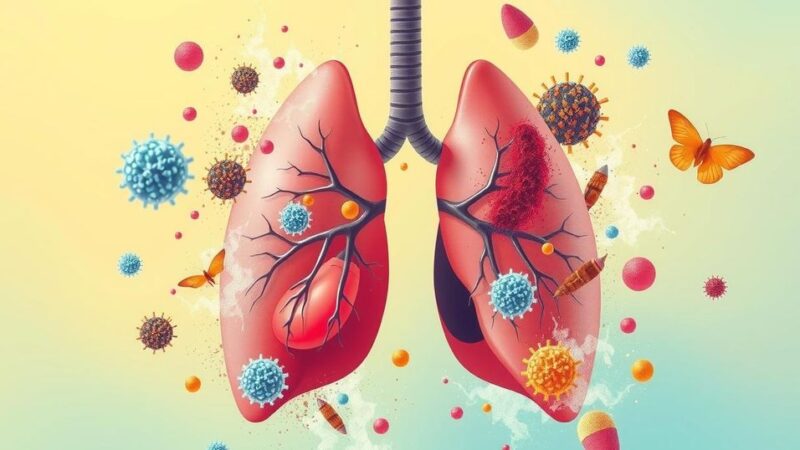Tobacco use is a significant health crisis in India, correlating with rising cancer rates. Cultural habits like “sutta breaks” contribute to increased tobacco use and exposure to second-hand smoke. Economic implications of tobacco are severe, with high costs to health care and productivity. Stronger measures such as increased taxation and banning single stick sales could help reduce tobacco affordability and usage.
India faces a rocky battle against rising cancer rates linked to tobacco use. The cultural norm of taking “sutta breaks”—paired with tea—imposes a danger of second-hand smoke exposure, especially for non-smokers in workplaces. Marketing executive Sandeep notes, “The chai-sutta break is where ideas flow as freely as the smoke.” But what starts as casual can spiral into serious health issues for many.
Statistics from the Global Adult Tobacco Survey (GATS2) show that around 42% of men and 14% of women smoke or use some form of tobacco across India. The country holds a staggering 70% of the world’s smokeless tobacco users. Interestingly, while bidis are still dominant, particularly among rural communities, there’s a noticeable shift towards smoking cigarettes which some youth consider to be more modern. Shopkeeper Rajesh reflects, “Bidis are what people here can afford. But now even in villages, people want to try cigarettes.”
Sadly, both smokeless and smoked tobacco dramatically heighten cancer risks—particularly lung, stomach, and oral cancers. Sunita, a homemaker, shares her family’s tragedy, “My uncle chewed tobacco for years and then passed away from mouth cancer, but we didn’t realize how dangerous it was until it was too late.”
With India leading the world in male cancer rates, the health crisis is amplified by poor economic implications. Tobacco use cost the Indian economy ₹1.77 lakh crore (1.04% of GDP) in 2017-2018. Rajiv, who quit smoking after a lung cancer scare, stated, “I never realized the financial toll until I saw the hospital bills.” A protracted public health crisis looms ahead unless actions are taken.
The tobacco industry wields considerable power—policy interference, competitive pricing, and marketing strategies contribute to tobacco’s accessibility. Ashok, a retired clerk, summed up the tragedy: “A bidi costs less than a cup of tea. When I was younger, I didn’t think twice about buying one. Now I see how cheap tobacco ruins lives.”
Taxation could be a potent method to curtail tobacco use, but it’s often ineffective. Although there’s a proposed GST increase, it’s not near the WHO’s suggested tax rate of 75%. Sadly, in India, incomes for many have risen faster than the tax rates, perpetuating the cycle of tobacco affordability. For instance, while bidis start around ₹5, some cigarettes also retail for as low as ₹5, making it dangerously easy to maintain the habit.
Another risky trend is the sale of single cigarettes; despite being banned in multiple countries. Because each stick is around ₹15, anyone can afford it without lingering over a pack’s graphic warnings. Shankar, a daily wage worker, shared, “Buying a few packs every day is something I can manage.”
Essentially, with significant numbers of earners at ₹170-180 a day, tobacco remains an accessible vice, with addiction further complicating matters. The need to curb tobacco is urgent if we want to halt cancer growth.
The World Health Organization’s MPOWER framework on tobacco control faces a major setback due to affordability issues. Effective strategies include consistent tax hikes, banning single-stick sales, and funneling tobacco tax revenues into health initiatives. Implementing plain packaging could help reduce its appeal, while limiting sales near tea stalls could combat the ingrained “chai-sutta” culture.
Ultimately, increased focus on cancer screening, cessation programs, and research is required to tackle this health crisis. As grieving widow Shalini poignantly said, “It’s not just about saving lives today—it’s creating a future where my kids don’t grow up thinking chai-sutta is normal.” It’s a wake-up call.
(Dr. Vid Karmarkar is a social entrepreneur and advocate for equitable cancer care. For inquiries: [email protected])
In summary, India’s burgeoning cancer problem linked to tobacco use is exacerbated by cultural practices and economic implications. The urgent need for stronger anti-tobacco policies combined with health initiatives is clear. Taxation and regulation are critical to reducing tobacco affordability and, consequently, cancer incidence. A collective effort is essential to create a healthier future for upcoming generations.
Sumber Asli: www.thehindu.com






